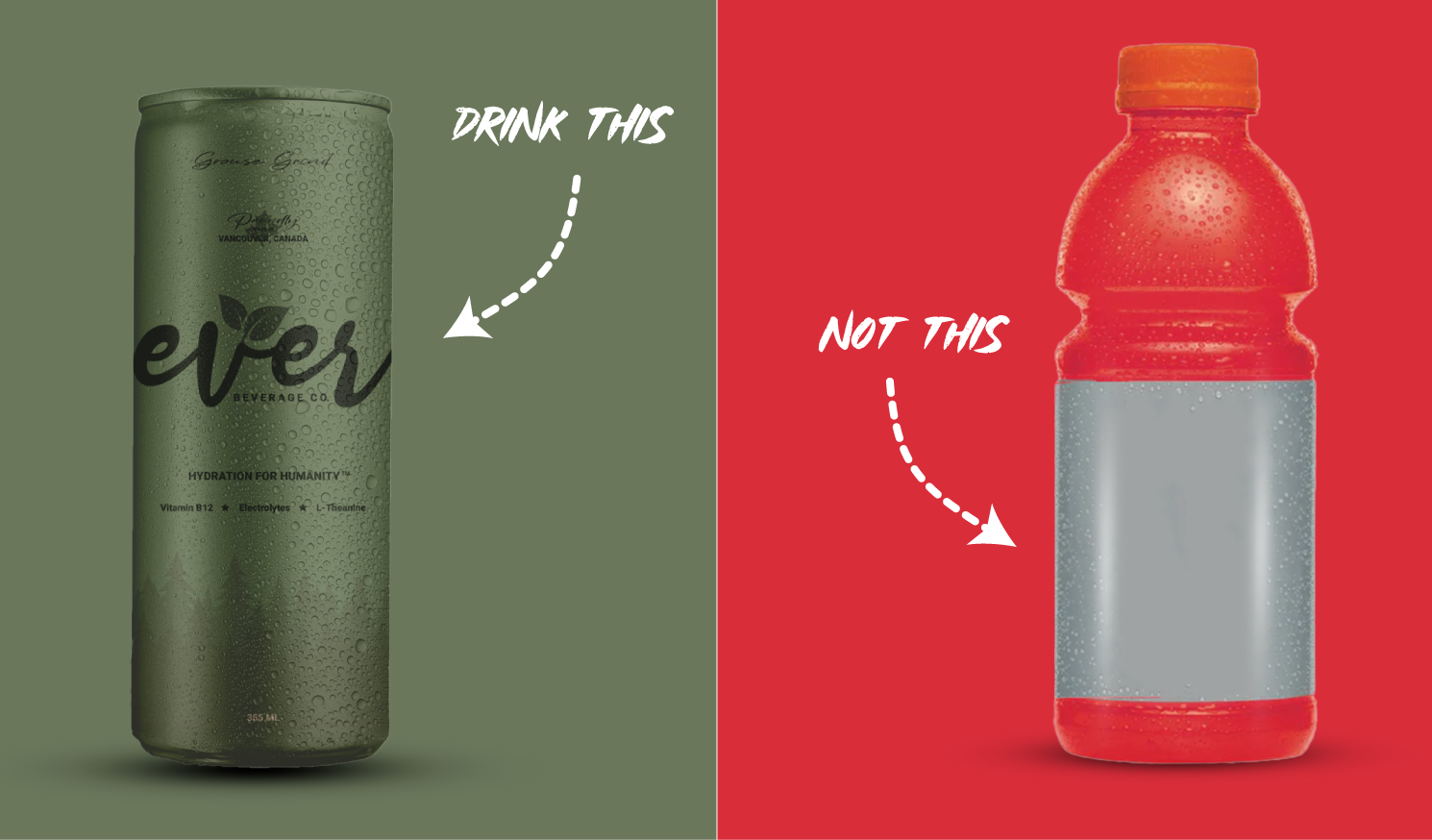
Energy drinks have become a popular go-to for many looking to boost their energy levels and stay alert. Marketed as a quick fix for fatigue, these beverages often promise increased focus and stamina. However, beneath their enticing claims lies a list of potential negative effects that consumers should be aware of.
In this post, we look at the dark side of energy drinks and some of the associated healthy risks that you need to know, as well, we’ll look at some more functional ingredients that you could consume instead.
A Growing Societal Shift
There’s a growing societal shift away from sugary, high-calorie, caffeinated sodas, juices, energy drinks, and RTD coffees towards more low-calorie, no-alcohol, low (or zero) sugar, natural & ethically sourced ingredients that offer some health or functional benefit.
Consumers are increasingly looking to beverages to satisfy different mood states throughout the day. These include health benefits such as improved digestion, energy, immunity, hair, skin and nail conditioning, sleep and cognitive health.
Negative Effects of Sports Energy Drinks
1. High Caffeine Content
One of the key ingredients in energy drinks is caffeine. While caffeine can provide a temporary energy boost, excessive consumption can lead to jitteriness, anxiety, increased heart rate, and difficulty sleeping. For individuals sensitive to caffeine, these effects can be even more pronounced.
While moderate caffeine intake is generally considered safe for most people, excessive consumption can lead to several negative effects:
Anxiety and Jitters: High doses of caffeine can lead to increased anxiety, nervousness, restlessness, and jitteriness. Individuals with anxiety disorders may be more sensitive to these effects.
Insomnia: Caffeine is a central nervous system stimulant that can interfere with sleep patterns. Consuming caffeine late in the day or in large amounts can make it difficult to fall asleep and negatively impact sleep quality.
Digestive Issues: Caffeine can stimulate the production of stomach acid, which may lead to digestive issues such as acid reflux, heartburn, and upset stomach in some individuals.
Increased Heart Rate and Blood Pressure: Caffeine can temporarily increase heart rate and blood pressure, which may be problematic for individuals with heart conditions or hypertension.
Dependency and Withdrawal: Regular consumption of caffeine can lead to dependency, where the body becomes accustomed to its effects. Abruptly reducing or stopping caffeine intake can result in withdrawal symptoms such as headaches, irritability, fatigue, and difficulty concentrating.
Bone Health: Some studies suggest that excessive caffeine consumption may interfere with calcium absorption and contribute to decreased bone density, potentially increasing the risk of osteoporosis.
Pregnancy Complications: High caffeine intake during pregnancy has been associated with an increased risk of miscarriage, low birth weight, and other complications. Pregnant women are advised to limit their caffeine intake.
Interference with Medications: Caffeine can interact with certain medications, either enhancing or reducing their effectiveness. It’s important to be aware of potential interactions and consult with a healthcare professional if you have concerns.
Dehydration: While moderate caffeine consumption is not dehydrating, excessive intake or consuming caffeine in place of hydrating fluids can lead to dehydration, which can have various negative effects on health.
It’s important to consume caffeine in moderation and be mindful of its effects on your body, especially if you are sensitive to its stimulant properties or have underlying health conditions.
2. Sugar and Calorie Overload
Many energy drinks are laden with sugar and calories. Regular consumption of these beverages can contribute to weight gain and increase the risk of developing health issues like diabetes and heart disease. Just look on the back of the industry-leading energy drinks and you will often see ’35 grams of sugar’ – that’s 9 teaspoons. That’s A LOT of sugar. In fact, too much sugar can actually lead to dehydration.
Sugar, especially when consumed in excessive amounts, can have several negative effects on health. Some of these include:
Weight Gain: Sugary foods and drinks are high in calories and can contribute to weight gain. Excess body weight is a risk factor for various health conditions, including heart disease, diabetes, and certain cancers.
Increased Risk of Heart Disease: High sugar intake has been linked to an increased risk of heart disease. It can lead to elevated triglyceride levels, lower HDL (good) cholesterol levels, and increased inflammation, all of which are risk factors for heart disease.
Type 2 Diabetes: Consuming too much sugar can lead to insulin resistance, where the body’s cells don’t respond properly to insulin. This can eventually lead to type 2 diabetes, a serious condition that requires lifelong management.
Dental Health Issues: Sugar is a major contributor to tooth decay and cavities. Bacteria in the mouth feed on sugar, producing acids that can erode tooth enamel and lead to dental problems.
Increased Risk of Certain Cancers: Some studies have suggested that high sugar intake may be associated with an increased risk of certain cancers, such as pancreatic cancer.
Negative Impact on Mental Health: Some research suggests that a diet high in sugar may be linked to an increased risk of depression, anxiety, and cognitive decline.
Skin Issues: Excessive sugar consumption may contribute to skin issues such as acne and premature aging. This is thought to be due to the role of sugar in promoting inflammation and affecting insulin levels, which can impact skin health.
Increased Risk of Fatty Liver Disease: Consuming too much sugar, especially fructose, can contribute to the development of non-alcoholic fatty liver disease (NAFLD), a condition characterized by excessive fat buildup in the liver.
It’s important to note that not all sugars are the same. Naturally occurring sugars, such as those found in fruits and vegetables, come with beneficial nutrients like fiber and antioxidants. It’s added sugars, often found in processed foods and beverages, that should be limited in the diet.
3. Health Concerns
Excessive consumption of energy drinks has been linked to various health problems. These can include headaches, digestive issues, and an increased risk of heart problems. The high levels of caffeine and other stimulants can also have a negative impact on mental health, exacerbating anxiety and stress.
Energy drinks are not recommended for children and adolescents. The high caffeine content can have adverse effects on developing bodies and brains, impacting sleep patterns and overall health.
Mixing energy drinks with alcohol is a common practice, but it can be dangerous. The caffeine in energy drinks can mask the effects of alcohol, leading to increased alcohol consumption and a higher risk of alcohol-related injuries.
What is Red 40?
Ever wonder how they get all the bright colours in energy drinks – the oranges, blues, reds, etc.? Look at the back and see ingredients such as ‘Red 40’. What is red 40? It’s derived from petroleum and banned in many countries. This is not something you want in your body.
Red 40, also known as Allura Red AC, is a synthetic food coloring commonly used in a variety of processed foods and beverages. While it is considered safe for most people when consumed in moderate amounts, some individuals may experience negative effects, including:
Allergic Reactions: Some people may be sensitive or allergic to Red 40, experiencing symptoms such as hives, itching, swelling, or breathing difficulties.
Hyperactivity: There is some evidence to suggest that certain food dyes, including Red 40, may contribute to hyperactive behavior in some children. However, more research is needed to fully understand this link.
Cancer Risk: Some animal studies have suggested a potential link between Red 40 and an increased risk of cancer, particularly in high doses. However, more research is needed to determine if this risk exists in humans.
Asthma: Red 40 has been reported to trigger asthma symptoms in some individuals, particularly those who are sensitive to aspirin.
Migraine Headaches: Some people report experiencing migraine headaches after consuming foods or beverages containing Red 40, although more research is needed to confirm this association.
Behavioral Issues in Children: In addition to hyperactivity, some studies have suggested that Red 40 and other food dyes may be linked to other behavioral issues in children, such as irritability and inattention.
Digestive Problems: Some individuals may experience digestive issues, such as stomach upset or diarrhea, after consuming Red 40.
It’s important to note that the safety of food additives, including Red 40, is regulated by government agencies such as the Food and Drug Administration (FDA) in the United States. These agencies set limits on the acceptable daily intake of food additives based on safety data. As with any food additive, it’s a good idea to consume Red 40 in moderation and be aware of any potential sensitivities or allergies you may have.
While energy drinks can provide a quick energy boost, they come with a host of potential risks. It’s important for consumers to be aware of these risks and consume energy drinks in moderation. Choosing healthier alternatives, such as staying hydrated and getting enough rest, can help maintain energy levels without the negative side effects.
Ever - The Anti Sports Energy Drink

Why we chose L-Theanine
L-Theanine is a natural amino acid found in tea leaves, known for its calming and stress-reducing properties. We included L-Theanine in our beverage formula because we believe in supporting mental well-being alongside physical health. By incorporating L-Theanine, we aim to provide our customers with a sense of tranquility and focus amidst life’s daily hustle and bustle. We understand the importance of finding moments of calm in today’s fast-paced world, and L-Theanine helps us achieve that goal.
Why we chose Magnesium
Magnesium is a vital mineral that plays a crucial role in various bodily functions, including muscle and nerve function, energy production, and bone health. We’ve chosen to include magnesium in our beverage because we recognize its importance in supporting overall wellness. Whether you’re hitting the gym, chasing after your kids, or simply navigating the demands of everyday life, magnesium can help keep your body functioning at its best.
Why we chose Potassium
Potassium is an essential electrolyte that helps regulate fluid balance, nerve signals, and muscle contractions in the body. Our decision to incorporate potassium into our beverage stems from our dedication to promoting hydration and optimal bodily function. Whether you’re sweating it out on a hike or simply staying active throughout the day, maintaining proper potassium levels is key to feeling energized and revitalized. By including potassium in our formula, we’re ensuring that our customers have the support they need to stay hydrated and perform at their peak, no matter what life throws their way.
Why we chose vitamin B6 & B12
Vitamins B6 and B12 are essential nutrients that play vital roles in energy metabolism, brain function, and the production of red blood cells. We’ve included these powerhouse vitamins in our beverage because we believe in providing comprehensive support for both body and mind. Whether you’re looking to boost your energy levels, sharpen your focus, or simply support overall vitality, vitamins B6 and B12 can help you feel your best.
Why we chose no added sugar
Unlike many sports and energy beverages that are laden with added sugars, Ever takes a different approach. We understand the detrimental effects that excessive sugar consumption can have on overall health, including weight gain, increased risk of chronic diseases, and energy crashes. That’s why we’ve made the conscious choice to exclude added sugars from our beverage formula. Instead, we rely on the natural sweetness of our ingredients and innovative flavour combinations to deliver a refreshing and satisfying taste experience.
Why we chose no caffeine
While caffeine is a common ingredient in many energy beverages, we recognize that not everyone wants or needs the jolt of caffeine to fuel their day. Excessive caffeine consumption can lead to jitteriness, insomnia, and dependency, leaving individuals feeling wired and fatigued in the long run. That’s why we’ve chosen to create a beverage that provides sustained energy without the need for caffeine. Instead, we’ve carefully selected ingredients like L-Theanine, vitamins B6 and B12, magnesium, and potassium to support natural energy production and mental clarity. Whether you’re looking for a mid-afternoon pick-me-up or a pre-workout boost, our caffeine-free formula has you covered, allowing you to stay energized and focused without the crash.




